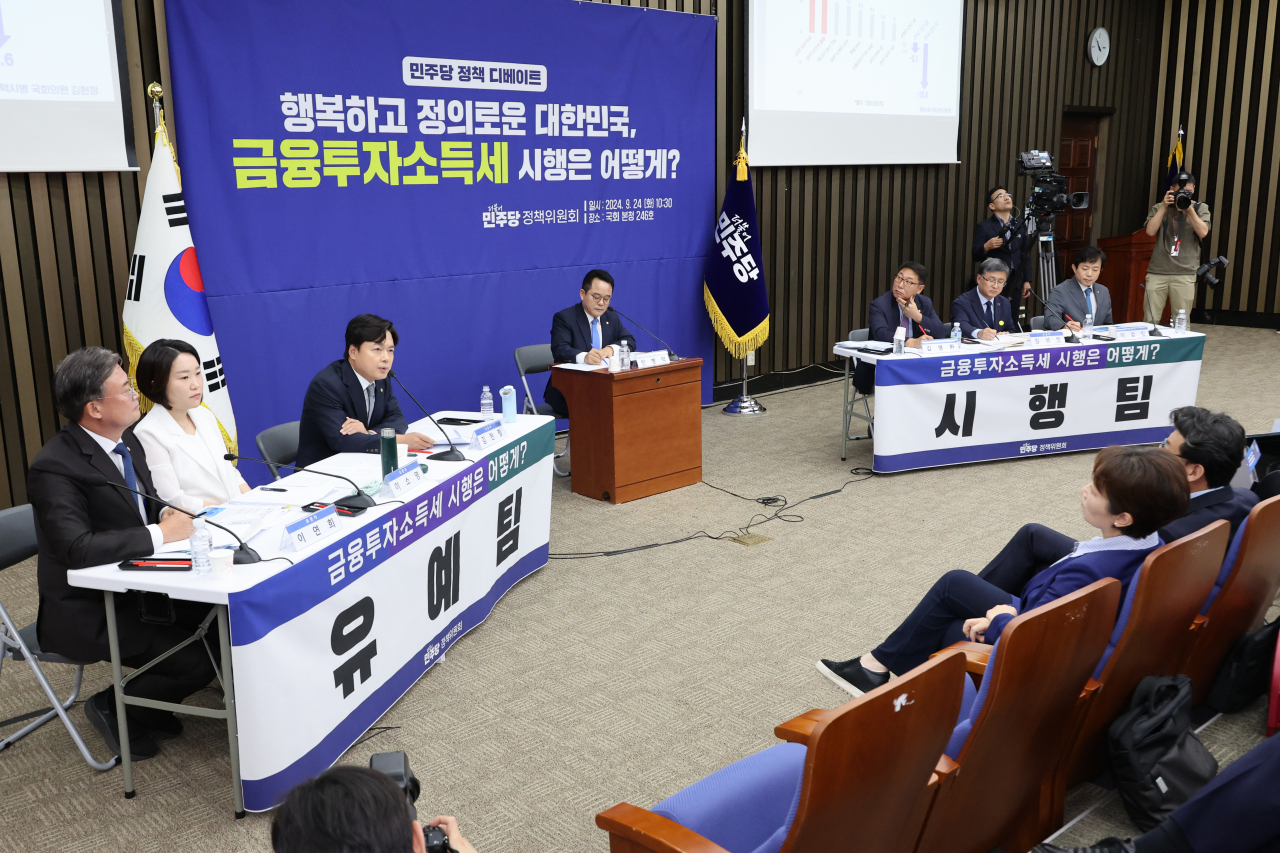 |
Democratic Party of Korea lawmakers hold an intraparty debate on the adoption of the financial investment income tax at the National Assembly on Sept. 24. (Yonhap) |
South Korea's main opposition party, whose lawmakers occupy a strong majority of the seats at the National Assembly, is leaning toward delaying the adoption of the financial investment income tax, observers said Sunday.
The Democratic Party of Korea will likely agree with ruling People Power Party Chair Han Dong-hoon's request last month to agree on postponing the implementation of the new investment tax policy set to take effect next year.
During a press briefing Sunday, Democratic Party Secretary-General Rep. Kim Yun-duck said, "Amid growing calls for a quicker resolution, I believe the issue of the financial investment income tax will be settled soon, whether through a leadership decision or by convening a general meeting of (Democratic Party) lawmakers."
The main opposition party's spokesperson Hwang Jung-a said in a Friday briefing that the party will hold a leadership meeting this week, with the tax policy high on the agenda.
The People Power Party has been urging the Democratic Party to agree on the abolition of the financial investment income tax, which states that capital gains of over 50 million won ($38,000) from stock investments will be subject to a 20 percent tax, while earnings exceeding 300 million won will be subject to a 25 percent tax.
The Democratic Party in recent weeks has been struggling to announce a stance on the implementation of the tax scheme, with its lawmakers expressing divided opinions on the matter. In an intraparty debate held Tuesday, some lawmakers claimed the tax scheme should go into effect as planned, while others called for a postponement.
The investment tax policy was originally set to be introduced last year, but was delayed by two years to the start of 2025.
Observers said that despite a faction within the main opposition pushing for the tax scheme to take effect on Jan. 1 next year, it is likely to be postponed, as Democratic Party Chair Lee Jae-myung expressed willingness to delay its adoption in the race leading up to the party leadership election in August.
On the other side of the political sphere, the ruling party has been struggling to bring its own key policy plan to life.
A four-way consultative body comprising the Yoon Suk Yeol administration, the two largest political parties and the medical circle to tackle the country's prolonged medical crisis, proposed by Han on Sept. 9, has yet to be launched, despite Han’s efforts.
In the past few weeks, Han has met several officials within the medical circle, including Lim Hyun-taek, chief of the Korean Medical Association, as part of his efforts to launch the consultative body. But the doctors and medical professors have expressed unwillingness to participate, saying the government should first scrap its medical school quota plan. The People Power Party had recently asked the doctors groups and professors to respond to Han’s request by Friday, but they remained mum as of Sunday, two days past the deadline.
Korea has been dealing with a nationwide medical crisis after a majority of junior doctors left their workplaces from February in protest of the government’s plan to raise the number of medical school seats by around 2,000 for each year over the next five years to address a shortage of doctors.
The KMA has called for the government to cancel its plan to increase the medical school admissions quota for next year and 2026 and to discuss a possible quota adjustment for 2027 or later. The government has yet to shift its stance on the matter, but hinted at room for flexibility, with Health Minister Cho Kyoo-hong recently saying that the plan for 2026 could be revisited if the medical community comes up with a rational alternative.
Han has been struggling to find middle ground with President Yoon and the Cabinet on the medical crisis.
While the ruling party leader requested a private one-on-one meeting last week on the sidelines of a dinner between Yoon and the People Power Party leadership, in an apparent attempt to discuss several impending items on their agenda, including the medical issue, the meeting failed to materialize.
People Power Party Rep. Kim Chong-hyuk, a well-known member of the pro-Han faction of the party's Supreme Council, said there is a gap in views between the ruling party leadership and the presidential office on key issues, including the medical reform plan, in a CBS radio interview held a day after the dinner.







![[Today’s K-pop] Blackpink’s Jennie, Lisa invited to Coachella as solo acts](http://res.heraldm.com/phpwas/restmb_idxmake.php?idx=644&simg=/content/image/2024/11/21/20241121050099_0.jpg)